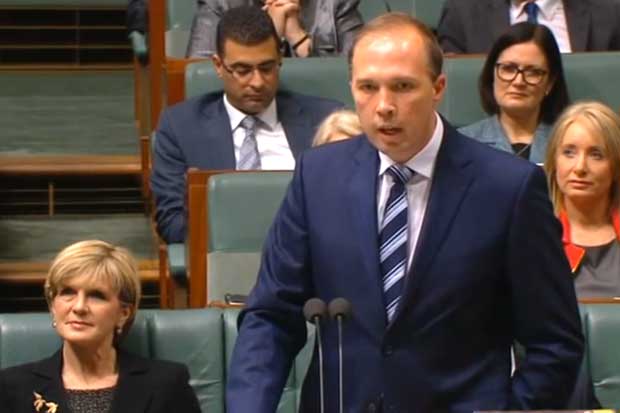Peter Dutton, flanked by Tony Abbott, charged into cabinet last week and asked for a power: to strip sole Australian nationals of their citizenship, whom he believes are terrorists, provided they are eligible for citizenship of another country.
The cabinet considered the proposal too extreme.
Being rolled by the Liberal Party for being too tough on terror is like being reprimanded for speaking over people at the 2GB meeting. It’s briefly embarrassing, but you still feel like a winner.
The proposal has one supporter from the Coalition backbench, and Peter Dutton continues to insist the administrative powers to strip citizenship are necessary. The advocates have obscured the draconian nature of the proposal behind policy-speak.
Stripping citizenship is not a mere administrative act, it’ss punishment. A person who loses her citizenship could be separated from family, stranded in a war zone, or sent to a country where she does not speak the language. It is called banishment; a punishment, you might remember, which was instrumental in the colonisation of Australia.
The decision to banish will be made by the “Honourable Minister”, which is the same as saying it will be made by some random white guy.
Barnaby Joyce, a man who threatened to kill Johnny Depp’s dogs, is a Minister. Kevin Rudd, a man who referred to himself as K-Rudd in the third person, was a Minister. Peter Dutton a man who boycotted the apology to the Stolen Generations and thinks it is reasonable for him to be given the unencumbered power to banish people, is the current immigration random guy.
Random guys are fallible. Especially those who are politicians born with an unnatural desire to be liked, and a professional need to be liked every three years. That’s why we leave some decisions to Judges, or, as I prefer to call them, tenured dorks.
I’m sure Peter Dutton is being genuine when he says the power would be exercised sparingly and reasonably. The question is would he or some other random dude exercise the power reasonably immediately after a terrorist attack, on the eve of an election?
I would not trust myself in such circumstances. If Australia fell victim to a terrorist attack, and I was charged with stopping the next one, I’d banish a First Fleet load of people. I’d banish the suspected terrorists. I’d banish people who failed to condemn terrorism on Twitter. I’d send people who looked at me funny to Nauru. I’d banish my Kiwi neighbors who keep nicking my recycling bin.

It is unnecessary, though, to speculate on whether powers such as this would be abused. We can just ask Mohammad Haneef. He had his visa cancelled by the then immigration guy Kevin Andrews on character grounds.
Haneef’s cousin had committed a terrorist attack in Scotland. There was no evidence that Haneef himself was involved, but can you blame Andrews for over-reacting? Political careers do not flame out because you arbitrarily detain an Indian Doctor. They end when you had the chance to stop a terrorist attack and failed to do so. Hindsight rarely respects civil liberties.
I’m not against punishing a bona-fide ISIS fighter. People whose trial period with ISIS does not work out cannot expect to be welcomed back to Australia with a hug. The state need not possess saintly powers of forgiveness.
Australia could, like the US, Canada, and France, require convictions before stripping citizenship from dual nationals. Wooses, says Abbott. The cabinet’s compromise was for courts to review the Minister’s decision, and the evidence. Not Abbott, Dutton, or the backbench’s first choice.
Dutton has explained that those who argue for convictions before banishment “don't understand how the intelligence is gathered in the Middle East… we don't have police, state or federal, patrolling the streets of [the Iraqi city of]Ramadi”.
It is hard to prove matters in court with foreign intelligence. There are no police gathering evidence, witnesses unable to testify without revealing sources, and no CCTV to draw on. Sometimes you know something but cannot prove it. Other times the fact you cannot prove something may also mean you do not really know that thing. I’ve never thought the solution to such a conundrum is to just let Peter Dutton decide.
This was the problem I thought we had addressed with the Foreign Fighters Act that creates an offense just for entering a “declared area” like Iraq or Syria, but I suppose that was last media cycle’s solution.
Then there is the final kicker in this scheme: you may not get banished to anywhere in particular. In the 18th century, the British justice system had the decency to ensure a corner in a ship heading to Australia was awaiting you. Abbott wants to banish people who are merely “eligible” for citizenship in another country. The actual chance of being granted that citizenship is irrelevant.
I’m not quite sure how you persuade a country to grant you citizenship when your last country broke up with you because of your terrorist tendencies.
Maybe you could convince your prospective new home that being evicted from Australia for terrorism is no big deal. You could, without lying, just explain that some random Australian guy called you a terrorist, and nobody will tell you why.
Donate To New Matilda
New Matilda is a small, independent media outlet. We survive through reader contributions, and never losing a lawsuit. If you got something from this article, giving something back helps us to continue speaking truth to power. Every little bit counts.





